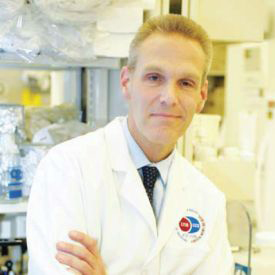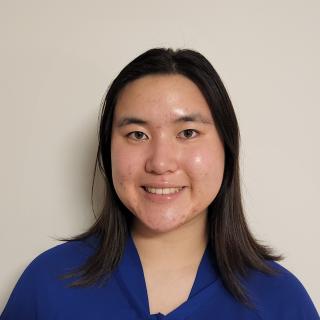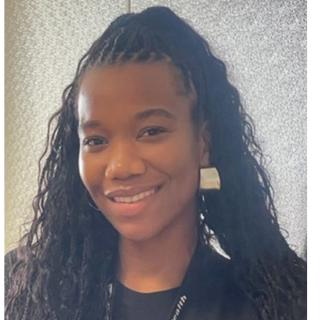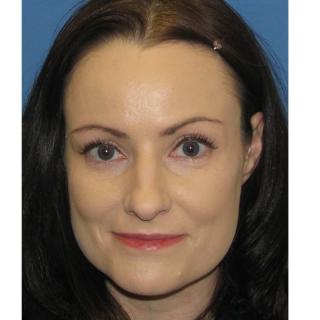
James W. Hodge, Ph.D., M.B.A.
- Center for Cancer Research
- National Cancer Institute
- Building 10, Room 8B13
- Bethesda, MD 20892-1750
- 240-858-3466
- 240-541-4558
- hodgej@mail.nih.gov
RESEARCH SUMMARY
Dr. Hodge is the Head of the Immunotherapeutics Section. This group investigates how combination immunotherapies and non-immune–based therapies affect tumor cells and specific components of the immune system. These studies form the rationale for novel immune- and non-immune-based combination clinical trials.
Dr. Hodge pioneered the development of vaccines and vaccine strategies for cancer immunotherapy including a) recombinant vectors to deliver tumor antigens, b) the use of costimulation to enhance antitumor T-cell responses, c) the combined use of vaccines with radiation, chemotherapy, and targeted small-molecule therapeutics. These concepts and therapeutics have been translated into many randomized multi-center trials at numerous Cancer Centers.
Areas of Expertise

James W. Hodge, Ph.D., M.B.A.
Research
The Center for Immuno-Oncology (CIO) Translational Research area's strategic plan focuses on the development of novel vaccines for human carcinomas, not only as monotherapies, but more importantly in combination with other immune-mediating modalities, and other conventional or experimental therapies, as part of an immune-oncology programmatic effort.
Overview. The Immunotherapeutics Section is involved in the development of novel recombinant vaccines, and vaccine combinatorial therapies. We study both mechanistically and operationally how certain radiation modalities, chemotherapy agents, small molecule targeted therapies, and immune modulators a) alter the tumor to become an immunostimulatory milieu, or b) modulate the tumor microenvironment to create a more immunopermissive hub, to enhance vaccine efficacy. Our team has worked independently and collaboratively with the CIO on the design, engineering, and development of recombinant poxvirus and yeast-based cancer vaccine platforms. The poxviral vector-based vaccines contain transgenes for tumor antigens and for multiple synergistic costimulatory molecules.
Research Focus. Immune consequences of cancer therapy include both direct effects on tumor cells and modulation of the immune system. My laboratory has focused on two areas: immunogenic modulation and immune subset conditioning. Immunogenic modulation describes the mechanism of how anticancer therapies alter the biology of the surviving tumor cells to render them more sensitive to immune mediated killing. Immunogenic modulation encompasses a spectrum of molecular alterations in the biology of the cancer cell that independently or collectively make the tumor more amenable to cytotoxic T lymphocyte (CTL)‒mediated destruction. Immune subset conditioning describes how anticancer therapies mediate the peripheral and/or intratumoral reduction of negative regulatory elements into a more immune-permissive environment for vaccine immunotherapy. Understanding the underlying mechanisms of these areas provide a rationale for the use of immunotherapy in combination with radiation, chemotherapy, small molecule inhibitors, and immune modulators. For a list of publications from the Immunotherapeutics Section, see Dr. Hodge's Full PubMed Summary.
Publications
- Bibliography Link
- View Dr. Hodge's PubMed Summary.
Biography

James W. Hodge, Ph.D., M.B.A.
Dr. Hodge is a Senior Investigator, Deputy Director for Translational Research in the Center for Immuno-Oncology, National Cancer Institute, and head of the Immunotherapuetics Section. Dr. Hodge received his Ph.D. in Comparative and Experimental Medicine from the University of Tennessee, and his MBA from the George Washington University. He was awarded tenure in 2016. Dr. Hodge is active in the area of tumor immunity, and has made significant contributions to the design and development of novel recombinant vaccines and vaccine strategies for cancer immunotherapy including a) recombinant vectors to deliver tumor antigens, b) the use of costimulation to enhance antitumor T-cell responses, c) the combined use of vaccines with radiation, chemotherapy, and targeted small-molecule therapeutics. The concepts and therapeutics developed within the Immunotherapeutics Section have been translated into many randomized multi-center trials at numerous Cancer Centers.
Job Vacancies
We have no open positions in our group at this time, please check back later.
To see all available positions at CCR, take a look at our Careers page. You can also subscribe to receive CCR's latest job and training opportunities in your inbox.
Team
News
Learn more about CCR research advances, new discoveries and more
on our news section.






